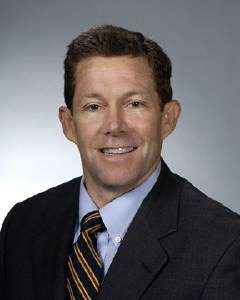Meet the Conservative Federal Judge Who May Force SCOTUS to Rule on Gay Marriage
Speaking last month at the University of Minnesota Law School, Justice Ruth Bader Ginsburg told the audience that there was "no urgency" compelling the Supreme Court to rule on gay marriage because the lower courts had not yet split over the issue. Indeed, since the Supreme Court ruled against the Defense of Marriage Act in 2013, no federal appeals court has voted to sustain a state ban on same-sex unions.

But as University of Minnesota law professor Dale Carpenter explains at SCOTUSblog, that unbroken streak may soon be coming to an end thanks to a looming decision by the U.S. Court of Appeals for the 6th Circuit, which is set to rule on gay marriage bans in Ohio, Kentucky, Michigan, and Tennessee. "The judge sitting in the middle of the Sixth Circuit panel on August 6 was Jeffrey Sutton, a careful and smart conservative jurist appointed by President George W. Bush and confirmed by the Senate in 2003. He is widely seen as the swing vote on the panel, with one judge a likely vote to strike down the state bans on same-sex marriage (Martha Craig Daughtrey) and one judge likely to uphold them (Debra L. Cook)." Thus, Carpenter notes, "the next step in the controversy over same-sex marriage likely depends on Sutton."
How might Judge Sutton vote? Carpenter argues that there is a real chance he will lead the 6th Circuit in upholding the gay marriage bans, thereby creating "a circuit split, practically guaranteeing review in the Supreme Court." Carpenter explains:
The Sixth Circuit could write a decision rebutting the numerous constitutional grounds for same-sex marriage, including equal protection and due process. It could try to explain why encouraging opposite-sex couples to procreate responsibly depends on excluding same-sex couples from marriage. It could try to clarify why children are best raised in homes where their parents are married while the parents of their best friends are not. It could hold that despite a history of horrendous and invidious discrimination the courts should not view anti-gay discrimination with any special suspicion.
Sutton might also uphold the gay marriage bans as an act of judicial deference, the legal philosophy which says that the courts should give lawmakers the benefit of the doubt and therefore rarely strike down democratically enacted statutes. After all, the last time Sutton found himself at the center of a roiling national debate over the wisdom of a controversial piece of legislation, he voted to sustain the law in part on those very grounds.
What case was that? It was Sutton's 2011 opinion in Thomas More Law Center v. Obama, in which the 6th Circuit upheld the constitutionality of the Patient Protection and Affordable Care Act, aka Obamacare. According to Sutton, the great legal battle over President Obama's health care law is "just as stirring, no less essential to the appropriate role of the National Government and no less capable of political resolution" than the debate over the constitutionality of the Second Bank of the United States at issue in McCulloch v. Maryland (1819). And in that foundational case, Sutton observed, "the Supreme Court erred on the side of allowing the political branches to resolve the conflict." Similarly, he declared, the fate of Obamacare should be decided by "the peoples' political representatives, rather than their judges."
Many gay marriage advocates were surprised and disappointed this week when the Supreme Court refused to take up any new gay marriage cases. Judge Sutton may soon provide the circuit split that SCOTUS (and everyone else) is waiting for.


Show Comments (1)